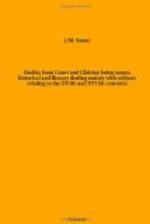Cromwell was deeply pledged to the Lutheran cause, and his plan was to throw Henry into the arms of the Lutheran princes of Germany. He had already flooded the country with foreign heretics, using them as his tools to protestantise the Church in England.
Jane Seymour died in 1537, and Cromwell at once negotiated a marriage between Henry and Anne, daughter of the Duke of Cleves, Henry consenting for the reason that it behoved him to fortify himself by an alliance that would enable him to make a stand against a possible combination of forces between the Pope, the Emperor, and the French King. But at the very moment when Cromwell, believing himself to be at the point of realising all his desires, was pledging his master to marry Anne of Cleves, a reaction had set in which he so completely disregarded as to seem in utter ignorance of it.
Nothing annoyed Henry more than to be twitted with being a heretic, and whenever Henry was annoyed a blow might be expected. The loathed epithet was now very frequently used in reference to him by the emperor and others, and he was bent on showing Europe that he could be a very good Catholic without the Pope. It irritated him to think that Cromwell had laid him open to retort in this contention by a formal alliance with the Lutherans, who were undeniably heretics. It served his purpose very well to play them off against the emperor and even Francis I., but it was not his will to be bound irrevocably by any contract. When Cromwell thought to put the finishing touch to his triumphant scheme, he only effected his own doom. He boasted to the Lutherans that he would soon bring England over to their forms of faith, and on this promise the match between Henry and Anne was concluded; but he failed to rouse the German princes to a contest with the emperor, which was all that Henry, apart from his minister’s policy, had aimed at from the beginning. With Henry the whole scheme was tentative, and the proposed marriage but a detail of that scheme. When it fell through, he desired to turn his back upon Cleves and the rest of the German princes; moreover, he had no further need of Cromwell himself, who was rather in the way of his new plans, unless the minister could find a means to disentangle the imbroglio he had created with regard to Anne.
Like a child with a new toy, Henry was now engrossed in the fun of being Pope in his own dominions; and as Head of the Church of England whom it behoved to reprobate heresy in every shape and form, he conducted a trial against one John Nicholson, who, refusing to recant his heretical opinions, was burned at Smithfield. After this he felt confident of being as Catholic as the real Pope, and safe from opprobrium. He proceeded to bring forward deliberations in Parliament on the subject of religion, with the result that the famous Act of the Six Articles was passed. This Act, nicknamed by the Lutherans “the whip with six cords,” brought in a reaction in favour of the old religion, which lasted till Henry’s death, but matters between England and Rome remained as they were.




